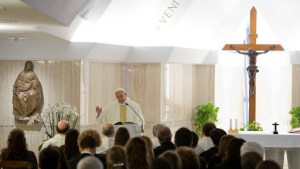Lenten Campaign 2025
This content is free of charge, as are all our articles.
Support us with a donation that is tax-deductible and enable us to continue to reach millions of readers.
I’ll never forget my first foray into group Bible study. Basically, it changed my life – all because of one sentence that should have great implications for every Catholic.
Though I didn’t know it at the time, it set me on the road to my martyrdom.
I was only one month into my freshman year at the University of Missouri-Columbia, destined to enter its prestigious School of Journalism. I had an intense passion for sportswriting. But my spirit also burned for the Lord, thanks to a Teens Encounter Christ retreat several months earlier when I began to feel a real relationship with Him. My days as a lukewarm Catholic had ended.
In late September, I saw a flyer on the Newman Center bulletin board promoting a study of Acts of the Apostles. Something tugged at me. I craved to know Jesus better and to love Him more. I ached to be a better Christian and figured studying the Early Church might present a good start.
So I signed up for the Wednesday gathering. I still remember lying on the floor reading the first chapter with a dozen other kids that first night. In that chapter, Jesus was preparing his disciples for his physically leaving them – the first Ascension Thursday. Those apostles wanted to know if the time had come for Jesus to restore His kingdom.
No, there would be no restoration of an earthly kingdom, at least not as they expected, but …
“You will receive power when the Holy Spirit comes upon you, and you will be my witnesses in Jerusalem, throughout Judea and Samaria, and to the ends of the earth.” (Acts 1:8)
I later heard that the word in Greek translated as “witnesses” in this passage also is the word for “martyrs.” Jesus was telling His disciples that when they received the Holy Spirit on Pentecost, that would enable them to be his martyrs to the ends of the earth. He said they would be men who would be killed because of their beliefs, that they would lay down their lives for him and his people.

Read more:
There’s a hidden prayer in the final petition of the Hail Mary
Most of us reading this today don’t have to worry about literally being killed for our Christian faith – though an unprecedented number of our brothers and sisters do – but we still are called to be martyrs. We are called to lay down our lives figuratively, to die to ourselves and witness with word and deed.
We have received the Holy Spirit. We have received that power to tell the world for whom we live and for whom we would die.
“In the Acts of the Apostles, St. Luke describes the extraordinary manifestation of the Holy Spirit at Pentecost as a communication of the very vitality of God who gives himself to men,” Pope St. John Paul II said. “This divine gift is also light and power: light, to proclaim the Gospel, the Truth revealed by God;power, to infuse the courage of witnessing to the faith, which the Apostles begin at that very moment.”
The point of being a witnessing Christian isn’t to impress anyone with holiness. It isn’t to show how happy we are as Catholics (though our joy is itself a powerful witness). It isn’t to achieve personal goals of seeing people’s lives change. We are called to detach from preferences and comforts in order to be attentive to God’s invitations in each day, to lay down our lives and to let the Holy Spirit work through us however God desires.
We’ve just celebrated the feast of Pentecost, remembering how the Holy Spirit enlivens our souls with gifts: wisdom, understanding, counsel, fortitude, knowledge, piety and fear of the Lord.
And with those gifts come great power: the power to know God well, the power to love Him deeply, the power to die for Him by giving up self-love and living for Him alone. The power to tell the world about Him, to “go and make disciples of all men.”
“When I see the need for Divine teaching and how hungry people are to hear it,” said St. Anthony Mary Claret, “I am atremble to be off and running throughout the world, preaching the word of God. I have no rest, my soul finds no other relief, than to rush about and preach.”
That requires power, a supernatural power. That kind of power — of the Holy Spirit — makes martyrs and witnesses out of common men and women. We are called to get out of the way, to surrender to our Lord. We are called to become a tool for God, a plaything in His hands, to do whatever He wants, however He wants, whenever He wants to whomever He wants.
That likely will mean dying, in some way.
“The Sainted Fathers say: Let’s imitate the martyrs!” Pope Francis noted. “We must always die a little in order to come out of ourselves, of our selfishness, of our well-being, of our laziness, of our sadnesses, and open up to God, to others, especially those who need it most.”

Read more:
Pope Francis’ 3 ways to follow the Holy Spirit

